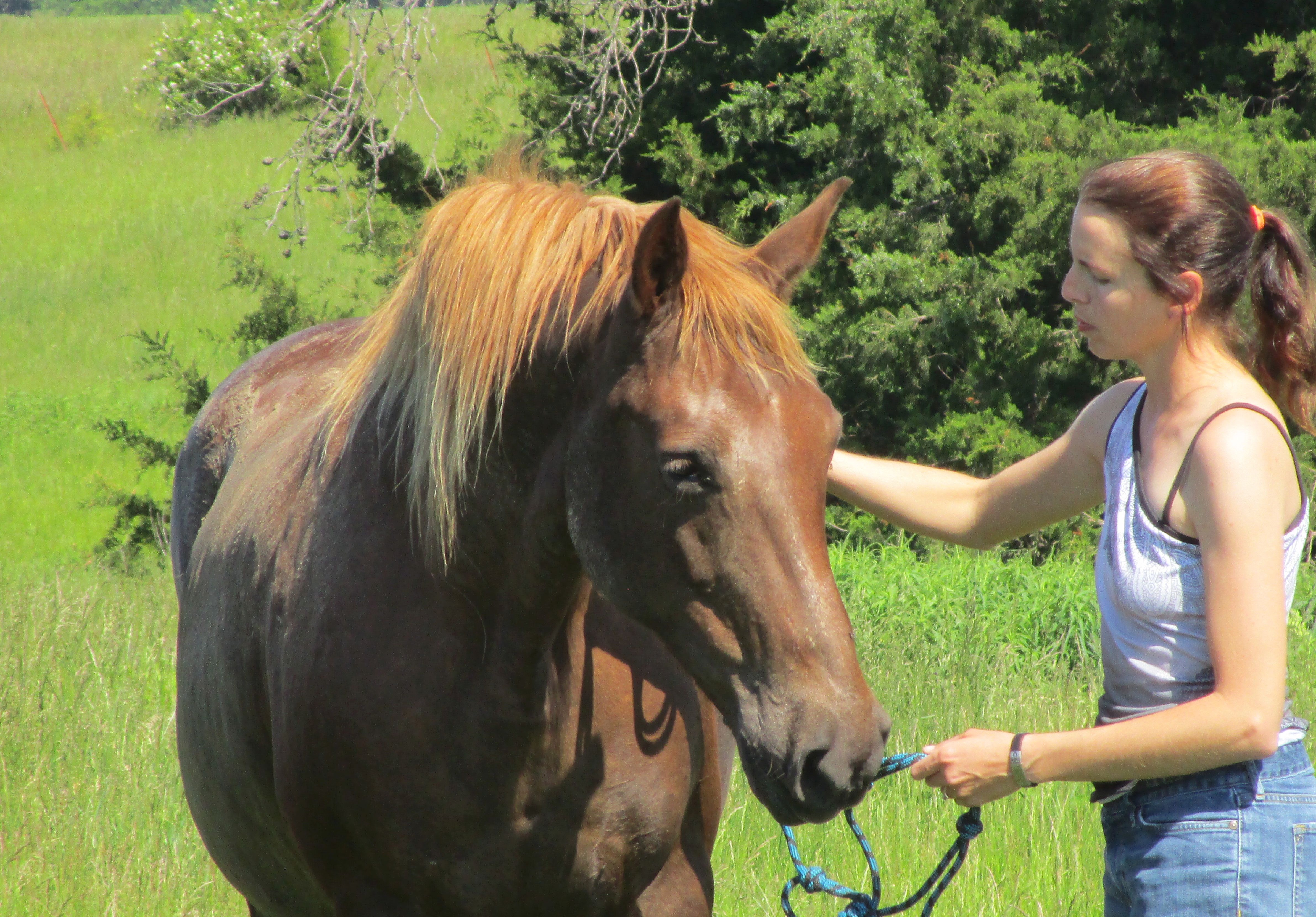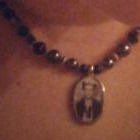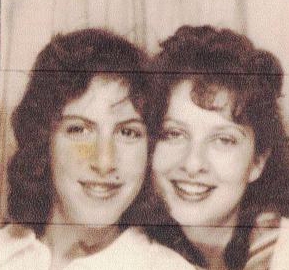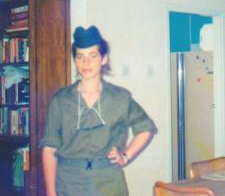I’d loved horses my entire life, but it was my husband who gave me my first. He sold his motorcycle to buy me a beautiful black-and-white Paint gelding as a wedding gift, but when birthing babies broke my body, I had to sell my horse.
It was my husband who told me I needed another. “You aren’t the same without your horse,” he said.
I’m not the same without my ovaries, or uterus, or cervix, I thought. But bitter words taste worse aloud, so I swallowed them and pretended I felt hope again.
I discovered that dreaming of horses kept away my nightmares. I bounced babies on my lap while I scrolled through classified ads, looking for a gentle, easy, friendly horse to distract me from the things I’d lost. To make me feel like the person I’d been before.
Several times, my husband and I loaded our kids up and hit the road to see a horse for sale. We visited barns and farms across the state, but in my heart I didn’t feel the click that would have said, Yes, this is the horse.
“Maybe I’m just not ready,” I told my husband, after driving away from a pleasant but uninspiring brown gelding with arthritis and bad knees.
And then, browsing the Internet one night when sleep drifted just out of reach, I found a blazing chestnut mare the color of burnished copper pennies, with a mane and tail of summer sun.
The classified ad showed her trotting across a pasture bright with wildflowers, and something about that picture snagged my heart with a hook of joyous possibility. She was marvelous in motion – balanced and brilliant, every flowing line of her body singing of athleticism and power.
But she was a wild mustang, caught on the range in Oregon. The ad said she couldn’t be touched. I made myself close the computer, switch the laundry, wash the dishes – any distraction to chase away the reckless thoughts spinning through my head.
I was still healing. What could I do with a horse that wasn’t even tame? That ad haunted me, though, until I picked up the phone on a gamble.
She’d been adopted off the range by a well-meaning but benignly clueless couple who really believed gratitude for their hay and water would tame her. But she’d once breathed the wind and galloped thunder so what did she care about these people chasing her with ropes and whips?
“She’s difficult,” they told me. “But not impossible. Not mean. She just needs someone with more time and patience than we have.”
Two weeks later, before the break of dawn, my husband and I tucked our sleeping children into their carseats, hooked up the horse trailer, and drove through hours filled with storms to reach a farm at the farthest edge of the state. As a shaft of sunlight streaked through a gap in purple clouds, I saw the copper mustang in living color for the first time.
She snorted when she saw me. Tossed her head and trotted nervous circles. “Aren’t you gorgeous?” I breathed, and she stopped, blew out her breath, licked her lips, and lowered her head.
I eased toward the fence, my hand held low and steady. The mare flicked her ears and snorted again, eyes rimmed white with fear. “I’ll never hurt you,” I whispered. Promised. Turning my head, making myself as unthreatening as possible, I waited…
...and felt the faintest brush of whiskers before her drumming hooves carried her across the corral.
“I can’t believe it,” the woman said. “She’s never come up to a stranger before. But I knew this would work as soon as we spoke on the phone. I had a good feeling about you.”
“You’re her last chance, you know,” the man said. “She’s been to three trainers and things didn’t go well. She’s not the kind of horse that can be pushed, but we just can’t keep her.”
“She’s had a rough time,” the woman added.
“So have I,” I told the mare in a quiet voice. Out loud I said, “I love her. I’ll buy her.”
I signed the paperwork with a shaking hand.
#
Before I became a farmer’s wife and a mother, before I ever rode a horse, I studied classical ballet. I spent hours stretching, striving, searching for the moments of perfect harmony that exist at the intersection of music and motion. I practiced until I could control every movement of my body, until I could dance in front of silver mirrors or across a slick wooden stage balanced on my toes. I taught my muscles to tell stories, shared my deepest secrets through the shapes I drew with my arms and legs.
After my surgery, I didn’t even know my own body anymore.
Time is a slow-moving glacier when you are healing.
I watched the moon roll to full and black and back again. Over and over. Watched my babies grow, and walk, and learn to shape new words with tiny tongues.
The pain dissolved, one day after another, but I was different.
Everything was different.
I couldn’t trust my own body anymore. I couldn’t dance. I couldn’t run. The strength and will I’d taken so for granted had somehow slipped away, lost with the pieces taken from me.
I’d stared my own death in the face and seen the shadows of its darkness in the corners of my hospital room, and something of it lingered in my memories, still. A cloud of desperate dread followed me, sinking fingers in my spine until I couldn’t shake it off.
Doctors can’t fix everything.
#
I named the mustang Gypsy because she was proud and fierce and strong, but she’d been chased from the wandering world she knew and torn from the places of her past.
I named her Gypsy, because when I watched her graceful movement she made me feel like dancing.
I was too excited to sleep, that first night we brought Gypsy home. Too nervous.
Before my kids woke up, I dragged my boots on and headed for the corral. Morning mist clung to the creek, but Gypsy was wide awake and wary. When she saw me coming, she threw her head up in alarm and snorted a warning.
“It’s okay,” I said. “You’re safe.” But when I met her eye, she exploded. Tossing her head, kicking up her heels, she raced around the corral as if she could outrun her fear.
Watching her from the corner of my eyes, keeping my shoulders rounded and my movements as small and unthreatening as possible, I slipped inside the corral to refill her water bucket. My heart fluttered in my chest like a captive bird. I wondered if fear would drive her to attack. If she was dangerous.
She was afraid I would hurt her, and I was afraid she would hurt me, and in that moment I recognized the precarious bond between us.
Keeping my eyes on the ground, I saw her shadow lower its head and heard her breathe out a sigh.
Truce, then.
I couldn’t approach her without driving her to run, so I had to wait for her to reach out first.
Our days that summer fell into a slow and steady rhythm. I’d clean the corral, fill the feeder with fresh hay, rinse and replace her water buckets while she watched me from the corner. Then I’d head for the house until my kids took their naps. While they slept, I sat just inside the corral gate with a book spread open in my lap and a bucket of alfalfa treats at my feet, sharing the silence with Gypsy.
After an hour or so, I’d head back to the house. Later in the evening, I’d return to check her hay and water buckets and say goodnight.
I left crooked stacks of dirty dishes in my sink and unmatched socks in a basket by the sofa. Every second I could spare, I spent beside my mare, but for weeks it felt as if we made no progress.
Then one hot and muggy day, she stood beside me as I read yet another cheap paperback. Slowly, trembling ever so slightly, she reached out and brushed my knee with her nose. When I didn’t move, she leaned closer and snuffled the pages of my book as if she wanted to find the happy ending, too.
As the summer spun toward fall, Gypsy learned to let me look at her. On her bravest days she’d brush my shoulder with her whiskers or touch my knee with her nose. But if I waved a fly away too fast or changed the scent of my shampoo or coughed or sneezed or moved just so, she’d spin away.
The scars stretched across my skin healed and faded and the empty ache inside my chest filled with thoughts of her, but her wounds were deep inside and still too raw.
I talked to trainers for advice, until one too many told me she was hopeless. I read every book on horses I could find, but none were written for a horse like her. Wild, angry, still afraid.
I spoke to the vet who’d cared for her when she was first adopted. “I remember that horse,” he said. “Did you know she had a foal shortly after her adoption? It was a bad deal. The foal showed signs of oxygen deprivation and infection, so they called the emergency vet out. He had to shoot her with a tranquilizer dart so he could take the foal to the hospital, but the foal died a few hours later. Last thing that mare knew, humans were pointing a scary metal thing at her and taking away her baby. No wonder she doesn’t trust us.”
“I had no idea,” I said, my heart twisting.
“They tried to pasture breed her a few months later, but she was so wild no one could get a hand on her for medical care. She developed a uterine infection and almost died. You aren’t thinking of using her for a broodmare, are you? Because the odds…”
“No! No,” I hurriedly assured him. “I’m just trying to understand her.”
I’d been betrayed by my body and bad luck and doctors who didn’t take the time to hear what I was saying, and Gypsy had been betrayed by people and fences and a world without enough patience.
I wondered if I’d already failed, if she was too traumatized to be tamed. But I wasn’t ready to give up.
I needed to find a language Gypsy could understand, so I could tell her she could trust me. Horses speak with their bodies. Ballerinas do, too.
We started dancing, Gypsy and I, in a strange sort of waltz. I’d walk forward and step back before she had a chance to bolt, like a mirror dance with a partner. I’d stroke her with my shadow when my touch would be too much, and slowly, slowly, slowly she began to settle. She learned to follow me with just one word, to walk beside me or behind me.
I showed her the new and shiny nylon halter I’d bought, but the gleaming buckles sent her back into a panic. This wasn’t the ordinary and expected hesitation of a horse confronted with something new and puzzling; this was terror, pure and simple.
I went back to the tack store and found a soft rope halter. This time, when I held it low, Gypsy was willing to investigate. She bumped it with her nose, let me rub it on her neck and shoulders.
I ran back to the house, my feet as light as feathers. “We’re almost there!” I crowed to my husband. “She didn’t run away from the rope halter. Tomorrow I’ll catch her.”
But the next day, she pretended she’d forgotten all about the rope, and we had to start again. She’d stand still and sniff it, but if I raised the halter to her face she’d run away.
“She’s not ready,” I told my husband later. “Maybe she’ll never be ready.”
“You’ve already done more with her and for her than anyone else has ever done,” my husband said that night when doubts clogged my throat with tears. But it wasn’t enough.
One night soon after, when summer’s death traced colored patterns in the leaves and ribbons of geese flocked overhead, when the earth breathed out her ghosts in wisps of fog, I stood at Gypsy’s shoulder and told her every truth I held. I told her what I wished for: a horse to ride across the meadow and along winding forest paths. And I told her what I feared: that I had failed her.
Like counting beads along a string, I whispered the moments that had made me who I was. The day I started dancing, the day I quit dancing. The day I rode a horse the first time. The day I went to college, met my husband, married him. The day I became a mother with a daughter, then a mother with a son. The day I almost died. And the day I answered a classified ad for a wild mustang mare with a coat like a copper penny and a mane and tail like sunshine.
She listened, and she sighed.
A golden harvest moon rose, ripe and full, above the hill behind the pasture. The air was dusk blue and scented with cedar and woodsmoke, I still remember. I let my words wind down and took a breath. “I have nothing left,” I said. Nothing left to try, to do, to say. “If you won’t be tamed, you won’t. At least here you can be safe.”
She turned her head to drown me in her deep, dark eye. She tipped her nose and nudged my hand, and in her face I saw a question.
So I answered by raising my arm – slowly, slowly – and I touched her shoulder. The muscles beneath her satin skin shivered and went still, and then she sighed again. I ran my hand along the proud crest of her neck and over her withers, across her back and down her shoulder. I stroked her barrel and her rump and ran my palm along her long, long legs. She felt soft as velvet and strong as steel, warm beneath my hand.
An owl called, then, and she startled. But she did not run away.
For a long moment we stood in silent stillness, wrapped in hard-won peace, breathing the same air. Quiet joy seeped through the cracks in my spirit and made me whole again.
I reached for the rope halter I kept with me, and I let her nose the coiled loops. She snorted and pinched her lips, but she let me slide it on and tie the knot.
At last I caught my wild mare and kissed her cheek.
Jennifer Adam is a writer and freelance editor living on a farm in the Midwest with her husband and two teenagers. Her first mustang led to a herd of four, and she has just started her newest horse in conditioning for 50 mile endurance trail rides. When she’s not riding wild horses, hiking with her dogs, or cheering for her kids, she can be found buried beneath a stack of textbooks with a pen and the latest draft of her novel.






